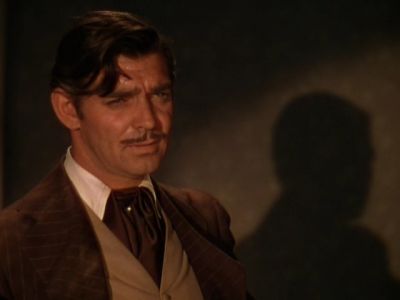 I broke up with the Legend–or, really, my relationship with the Legend ended–because he ignored me in front of his ex-wife’s current wife and her infant son. If that sounds complicated, it’s actually a lot more complicated, but the bottom line is he clung to the sense of family that his ex and her clan provided him, and played uncle to her son as well as her sister’s kid. I’d always empathized with his desire to do so. But this meant that he was ignoring me in front of his people, and the sting was profound. It was hardly the first time he’d thrown me under a bus, but I suddenly saw how little he’d ever rally for me, how little I meant to him, and that only one path extended from that moment on my personal timeline.
I broke up with the Legend–or, really, my relationship with the Legend ended–because he ignored me in front of his ex-wife’s current wife and her infant son. If that sounds complicated, it’s actually a lot more complicated, but the bottom line is he clung to the sense of family that his ex and her clan provided him, and played uncle to her son as well as her sister’s kid. I’d always empathized with his desire to do so. But this meant that he was ignoring me in front of his people, and the sting was profound. It was hardly the first time he’d thrown me under a bus, but I suddenly saw how little he’d ever rally for me, how little I meant to him, and that only one path extended from that moment on my personal timeline.
And that path was Legend-free.
That’s exactly how I saw it. Even as I blew up at him later, even as I railed to friends, even as I masturbated with a violent grief, some part of me already was watching dispassionately from a future I now knew existed. A future in which this man I loved had no place.
That’s how I explained the breakup to people as soon as I was sure it would stick. With concern and maybe a little ennui knitting their features, they’d say, “How are you doing?” And I’d say, “I’m in the future now.”
I knew it was true even though I didn’t yet understand what I was saying.
The truth, as is always the case with unhappy relationships, is that my affair with the Legend revealed every fissure in my life: My tenuous financial reality, my transactional rather than reciprocal relationships, my lifelong loneliness and desperation. Most of all, it revealed a heartbroken child who was sure that if she could just improve her game she’d finally be loved by her parents.
As an adult–and, really, I’ve only been an adult since age 35–I have fallen in love two times. Once with Mr. Oyster and once with the Legend.
Both experiences were disasters.
Mr. Oyster at least took the time to understand my background, my proclivities, the wounds I carried. Showed up at my door with arms overflowing with pleasures and treasures. It took a miscarriage and five years of bloodshed for me to extricate myself–to accept he’d never make space for me in his life.
So the first time I realized the Legend was not going to prioritize our relationship or my feelings, I felt a familiar quicksand beneath my feet. I already had given him my heart, and the hurt child I carried did not think I could get it back. Which meant I was once again anchored to someone who would let me sink.
This is my oldest story. That the only way to ensure my survival is to extract blood from a stone–to secure love and attention from someone who can barely feel their own feelings, let alone anyone else’s.
As a child, my first and foremost prayer was: “Please don’t let me stop feeling.” I’d already observed from the adults around me how dangerous and empty life became once you stopped.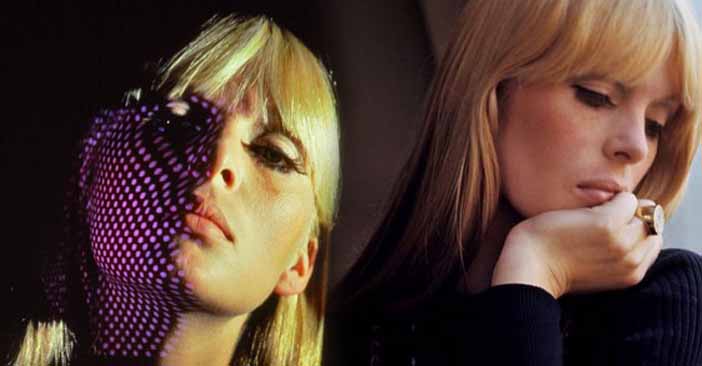
And yet, when I realized the Legend couldn’t feel much of anything, I did not run for the hills. Instead, the little girl in me rolled up her sleeves. “This time we’ll get it right,” she announced. “This time will make up for all the other times.”
I had recognized a sweetness in him–his own hurt child–as well a gorgeous curiosity and charisma and chemistry that made me happier than I’d felt in a very long time.
And of course there was the sex. Lamp-crashing, time-swallowing, thirsty thirsty sex. For months he and I walked around with stupid smiles and inexplicable bruises–the kind you don’t remember inflicting or receiving because you were in a greedy heady swoon of more-more-more (more flesh more hardness more softness more sweet-sweet-sweet wet). Really, I hadn’t had sex like that in decades.
Really, I hadn’t had sex like that ever.
But sex like that goes hand in hand with everything subcutaneous subconscious sublimated being unleashed. It’s vulnerable-making, which makes it as dangerous as glorious. Especially if you’ve spent a lifetime protecting yourself.
Which both of us had.
With two hurt children running the show, things got very ugly very fast. I’d panic at the slightest indication he “was going to let me go there by myself,” as Joni sang. And my panic would give him license to do exactly that. He’d belittle me, come and go on his terms alone, drain my resources without replenishing them, privilege his issues and agenda at the expense of my own.
And I’d sulk and erupt rather than behave as the sensible woman I egotistically prided myself on being.
That woman would have gracefully bowed out. Instead, I’d anxiously await his return.
I knew we were in trouble when, after seven months, he did not know how I took my coffee though I fetched his two large iced coffees with milk whenever he stayed the night.
I knew we were in trouble when, the day after we first had sex, he cancelled our plans and posted pictures of the celebrity-laden party he attended instead. It was Mother’s Day, which I’d told him was my hardest day of the year.
There were so many indications that my feelings did not matter enough for him to cover his tracks, let alone earn his keep. Yet I continued to try to make myself so desirable and indispensable that he’d have to love me back. He complained that I did not listen to him, but though it was excruciating to hear about a life to which I was not invited, I studied him closely, not just because, as Marge Piercy writes, “attention is love,” but to earn my keep.
Understand I know I am to blame, too. My Child kept fighting to be seen– stamping her feet, gnashing her teeth, sure if she didn’t succeed this time she’d never survive.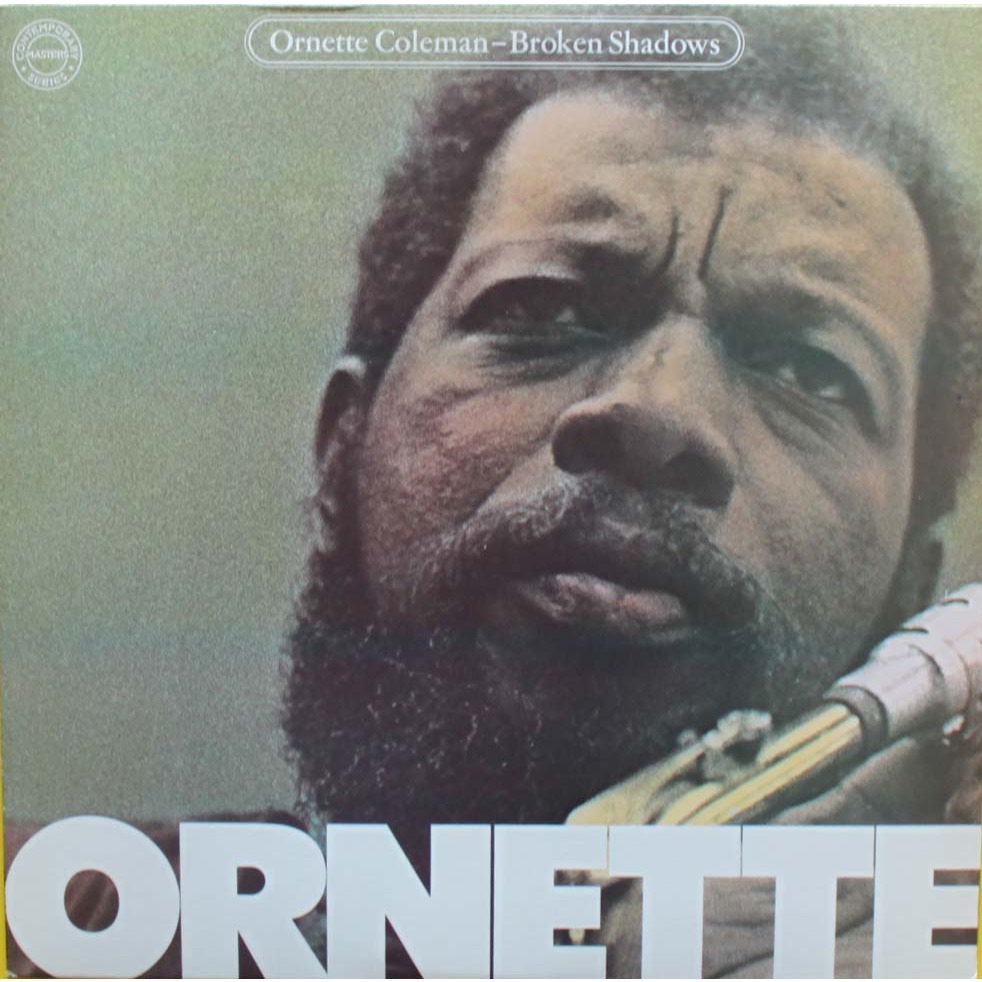
That she’d fall into the black hole ever-widening beneath her feet.
She didn’t understand it was the Legend himself who was the black hole in her life, just like Mr. Oyster and her parents before him. Sucking her in to their bottomless unhappiness–their need to be fed, to be seen, to feel the love from others they couldn’t feel themselves. She didn’t understand that nothing and no one would ever be enough so long as there was no center of self-love in that maelstrom.
That the black hole was her, too.
But nothing remains the same. Even if it looks unchanged, entropy always kicks in. Thus we experience worse and worse variations on our primary traumas until they are so baldly recreated that we can look nowhere but their source. Which is to say: The Legend treated me with such increasing disregard that I actually said, “This is how I will fall out of love with you.” I had never said anything like that in my life. I had never dared think it. But something ancient and loving clicked into place that afternoon at the coffee shop–my favorite coffee shop, the coffee shop where we’d met. And it made me realize that falling out of love–waking from the trance–was something I could do.
Because his self-accommodating dismissal–clearly he’d shit-talked me so much he was embarrassed to acknowledge our bond–showed the Child what she had been unable to see until then.
That no matter what I did or who I was, no one deserved to be treated the way I was being treated.
Not even my Child.
So what had launched so joyously in the early spring landed with a thud on that early November day.
It weighed on me that I did not exit with grace. That I actually made a face before flouncing off. It gave the Legend license to treat me with disdain rather than compassion.
Still, this time I did not beg for forgiveness and he did not come back around.
The holidays came–Thanksgiving, his birthday, Christmas, New Year, my birthday and finally Valentine’s Day– and were terribly sad and lonely. Yet I knew they would have been far worse had I still been waiting for his crumbs.
As the months wore on, I actually began to feel grateful to the Legend, though I didn’t wish to be in contact. He had given me back my sense of beauty and body, and introduced me to my primary heartbreak.
And now I was in the future–a place I had not imagined existed. A place where I could walk away when I was not welcome.
It felt rudderless and unsafe.
—————————————————
“No one cares if I disappear,” I cried to my therapist. “No one cares if I fall apart.”
“I do,” she replied calmly.
“Where do I go from here?”
With that question, she paused. “The only real way to change your life is to accept you can control your actions but not the outcome,” she said. “You have to accept the unknown.”
That stopped me in my tracks. She was describing a real future–a place that wasn’t just a retread of where I’d been before. But as I heard it, she also was describing the abyss.
Which forced me to recognize how far I had traveled from the Flow.
The Flow is what my intuition shows me for other people–the paths and callings emanating from their true selves, which are part of the divine. In fact, the Flow is the divine, and as a younger person it protected me above all else. I’d listen and look for it, and it would show me what to do even it meant disobeying adults and alienating my peers.
But though I always can channel the Flow for others, I’d become so frightened of drowning in it that I’d stopped submitting to its awesome, terrible pull in my own life.
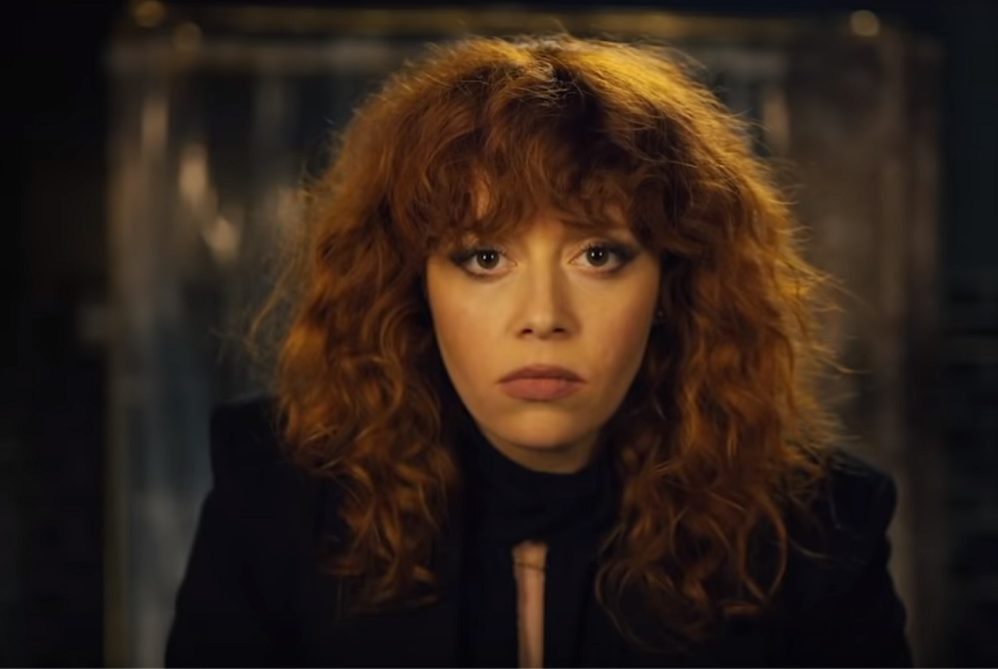 And you only can tread water for so long before you drown.
And you only can tread water for so long before you drown.
Enter Russian Doll.
—————————————————————————
At first I just wanted to see the Netflix series because I was miserable and Natasha Lyonne is a wonderful distraction. The show’s premise: Videogame designer Nadia (Lyonne) is trapped in a time loop in which she repeatedly dies hours after her 36th birthday party. It was very Groundhog Day, and there already was a Groundhog Day feel to how many variations on Groundhog Day existed. But the prospect of Lyonne’s old-Jew razzle-dazzle, those kewpie doll eyes and unruly curls, was irresistible. And from the first shot of Nadia studying herself in a bathroom mirror, it was clear I was in for a new level of storytelling.
————-
The bathroom itself is a neo-gothic womb–a pistol for a door handle, O’Keeffe-style lights shimmering on midnight walls–and as she’s staring at herself the door starts to bang. So she lurches into Vegas performer mode, over-it and under-it all at once, and swaggers back into her birthday party where she banters with her besties before picking up a professorial lout–grey skin, receding hairline, unsolicited opinions. She fucks him. Then hits the deli and, uh, fatally walks into incoming traffic.
And wakes staring at herself in that vagina of a bathroom.
Again. Again. Again.
At first she tries to make sense of the loop in which she’s ensnared. No one else is having a déjà vu, so the gulf between her and the rest of the world widens. Some circumstances change—especially the way she dies–but she always banters with her besties. Always avoids the topic of her mother, who also died at 36.
Always wakes staring at herself in that vagina of a bathroom.
The dirgelike repetition recalls All That Jazz, Bob Fosse’s extraordinary meta-movie about show business and mortality that predicted the circumstances of his fatal heart attack. It’s not just how Roy Scheider as Joe Gideon, Fosse’s stand-in, begins every day staring disgustedly in a bathroom mirror before donning the “it’s showtime, folks” mask. It’s the way entropy creeps in.
Fruit begins to rot. Fun begins to sour. Drugs and booze and empty sex take their toll.
Only in Russian Doll–shot in the same scarlet and ebony palette as Jazz (one of my favorite films as well as Lyonne’s)–the entropy is not just natural. It is super-natural, which works well, because so is the very bumpy road of recovery.
A computer scientist at heart, Nadia tries to work the problem, only to keep discovering rabbit holes that lead nowhere. Is she going mad? She consults Ruth (Elizabeth Ashley), her guardian after her mother died. A New York psychiatrist with as appealing a rasp as Nadia’s, the older woman offers to put her on a psych ward. But the ET guys transporting Nadia to Bellevue seem even more hung up on their mommies than she is. (In one of the series’ many fabulous winks, they’re played by the same dudes who play her tech-bro colleagues as well as Wall Street douches in the deli.)
Before she has a chance to bust herself out, they get in a fatal accident.
Next she examines the Isreali joint she shared with Maxine (Greta Lee), one of her besties. Was it laced with something more toxic than cocaine? Ketamine, as it turns out, but that drug hasn’t addled our girl in the past because “no one loves drugs like I love drugs,” as she announces cheerily.
So does the time loop stem from the fact that Maxine’s apartment, where the party is being held, is housed in a former yeshiva?
To consult an orthodox rabbi–he won’t speak to an unattached woman–she ropes in her ex, a dry drunk she unceremoniously dumped after he left his family for her. He’s not a Jew but he “fucks like one,” she says, adding unnecessarily, “That’s a good thing.”
“Really?” he says, momentarily charmed out of his resentment of her.
And here’s when things get really interesting. For the rabbi hones in on the poor schmuck’s obsession with Nadia.
“Mysticism teaches us that there is wisdom unattainable by the intellect,” he says. “You can only reach it through surrender. The nothing. Turn away from the physical world. Turn toward the spiritual one. Maybe Nadia is just a way to stay distracted. To avoid the abyss. When embracing it is the only way forward.”
“Right,” says the ex. “So that building isn’t haunted?”
“Buildings aren’t haunted,” the rabbi replies. “People are.”
—————————————–
I nodded vigorously and replayed the scene until I’d transcribed it verbatim. Then I pressed play again.
—————————————–
In a fatal elevator accident, Nadia meets Alan (Charlie Barnett), who’s as nonplussed by their incipient death as she is. It turns out he’s in his own time loop, complete with a bathroom routine. In his, he gets dumped by his long-term girlfriend Beatrice (Dascha Polanco) before he dies.
Again and again, though he only commits suicide the first time.
Once Nadia realizes she’s not alone in the loop, she starts to really hunt down the bug in the program. Why is the loop happening? How can they close it?
Alan suffers from untreated OCD, and is unwilling to look too closely at the mouth of what, to him, reads as a gift horse. Even with the built-in unhappiness of the Beatrice breakup, Alan is most comfortable when he knows what to expect.
But Nadia–who is as chaotic as Alan is hyper-controlled–ushers change into his life. Soon after they meet each other, he discovers Beatrice has been fucking her professor–the same dude Nadia fucked before her first death. More conventional than Nadia, Alan decides their loop is happening because they’re “bad people,” but she dismisses this theory as “morally simplistic and narcissistic.”
Eventually they realize-and herein lies a spoiler–that their loop is contingent on each other. That the first time they met, it was at the deli–he blind-drunk over the breakup, she so careless she was about to step in front of a moving car. But they were so self-involved that they didn’t register each other’s humanity, let alone save each other’s lives.
And now Nadia begins to be haunted by her younger self.
We learn that Nadia’s mother, played by Lyonne’s real-life best friend Chloe Sevigny in an Annie wig and a thick New York accent, was an unhinged bulimic who dragged little Nadia around New York for watermelons she could stuff in her convertible and then herself. She really was mad, you see, and in a flashback we see Nadia shrink into herself as her mother spools further out of control, retching and smashing all her mirrors like an Alice struggling not to see through the looking-glass.
Every time little Nadia appears, big Nadia dies.
For much of the series, Nadia has been trying to do right by her ex by bringing a copy of Emily of New Moon to his daughter, whom she has never met. Emily is little Nadia’s favorite book–darker and more supernatural than author LM Montgomery’s more popular series, Anne of Green Gables–and big Nadia had intended to bring it to the daughter when she broke up with her dad instead. No coincidence there.
No coincidence anywhere.
When she finally gets the book to the daughter, little Nadia appears and big Nadia begins to choke on a huge shard of mirror glass.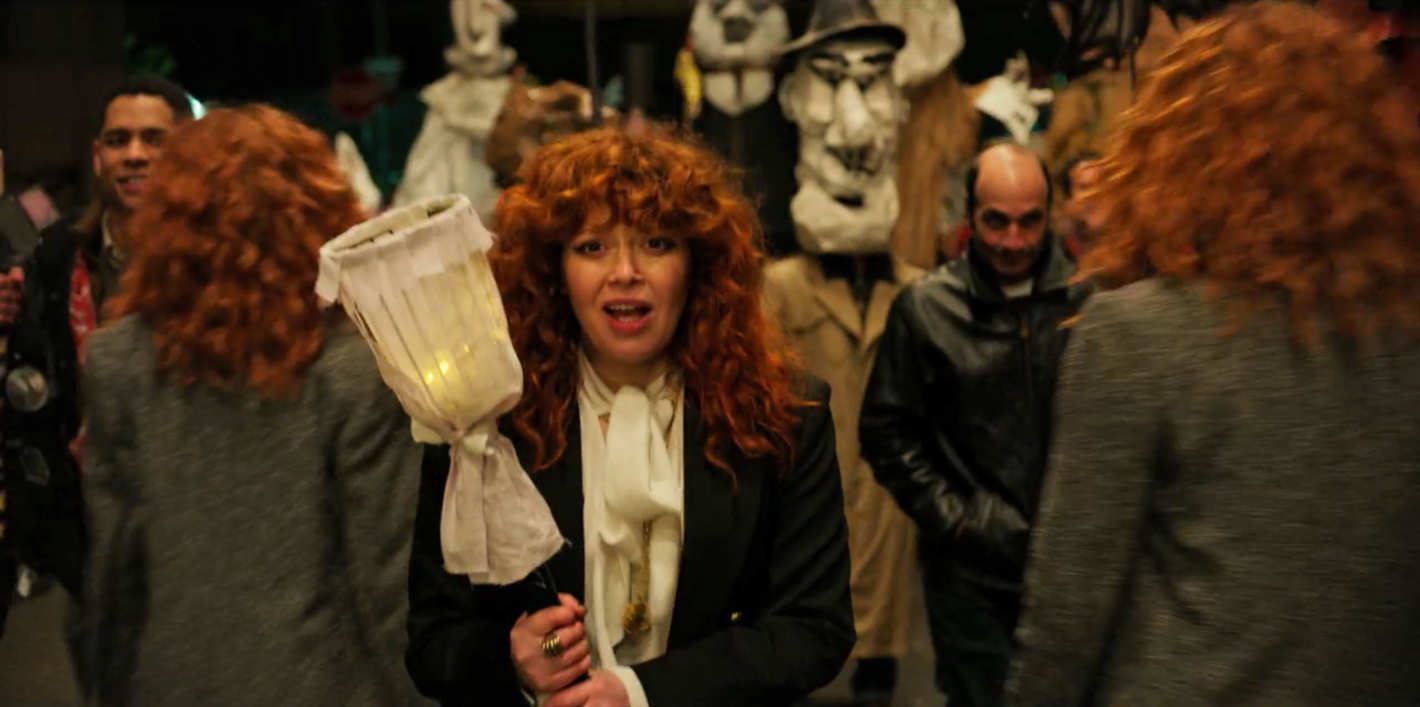
Before she dies this time, Little Nadia says, “This is the day we get free.”
Chills.
The next time they wake, Alan and Nadia are split into two time lines. In each, the one who is aware of the loop must save the one who is not. Nadia talks Alan out of offing himself by convincing him that “he may not be happy but he won’t be alone.” Alan saves Nadia from her destructive self-involvement by rescuing her from an oncoming car.
If the series begins as Fosse, it ends as Fellini–two Nadias and two Alans conjoining in a surrealist Dolce Vita parade streaming through Tompkins Square Park.
—-
I sat in my apartment, more peaceful than I’d felt in months. Then I opened my computer to research the series as I started it again, a Russian Doll-style immersion in Russian Doll.
I’d known the production was hyper-personal for Lyonne, but hadn’t realized her mother had been a Holocaust survivor who’d pimped out her kid as an actress. Judging from the fact she and Lyonne no longer had a relationship, it seemed fair to assume Nadia’s mother was based on her. And while everyone knew about Lyonne’s heroin habit, I hadn’t realized it had resulted in open heart surgery for which she’d had to remain conscious on the operating table. That’s pretty close to a living death right there.
I’d also not known Lyonne was an avid reader and philosopher who’d conceived of all the show’s metaphysical flourishes. Nor had I known that she’d wanted to quit acting to become a filmmaker but had so destroyed her credibility that she was lucky to score the Orange Is the New Black gig after emerging from her bottom. Only by committing to the arduous process of recovery had she been able to loop back to her dream of becoming a creator.
The irreplaceable Amy Poehler and Lyonne had first launched Russian Doll as a network TV pilot entitled Old Soul. But thank g-d it had failed, because in its current incarnation it was possibly the best use of the freedoms and formats afforded by Netflix thus far–so good-looking, so funny, so 4D, and so old-girls-network. Lyonne, Poehler and Leslye Headland were co-creators and writers along with three other women in the writers’ room. But I’m a Cheerleader helmer Jamie Babbitt (with whom Lyonne had worked in the gay 90s) had joined Headland and Lyonne as episode director. Headland’s wife Rebecca Williams played one of Nadia’s besties. And so on.
The abundance of lady energy certainly explained for the “all white dudes look the same” easter egg buried into the casting. It also might have had something to do with how little we learn about Alan’s initial trauma compared to Nadia’s. Either way, I was into it. It was so rare to view a woman as the sort of magnetically flawed, lone-wolf anti-hero that men have been playing since the beginning of cinema.
But that was just the beginning of why I dug the show. I was wowed by its futuristic past perfect, its brilliant dig into the metaphysical black hole that is narcissism. I was wowed by how super Jewish and New York it was. How super-supernatural. How super-superconscious. I loved that Lyonne had reshaped her PTSD into a tesseract of post-traumatic growth that was advancing the collective consciousness with uniquely ragged charm.
I contacted some friends who also were watching it, and we embarked on a scavenger hunt of its hidden treasures, tracing our own paths of recovery in its four-dimensional map of self-revelation. I marveled over how the show was working in real time to enact its themes of collaboration and communion, something I had privately made a goal for my 49th year.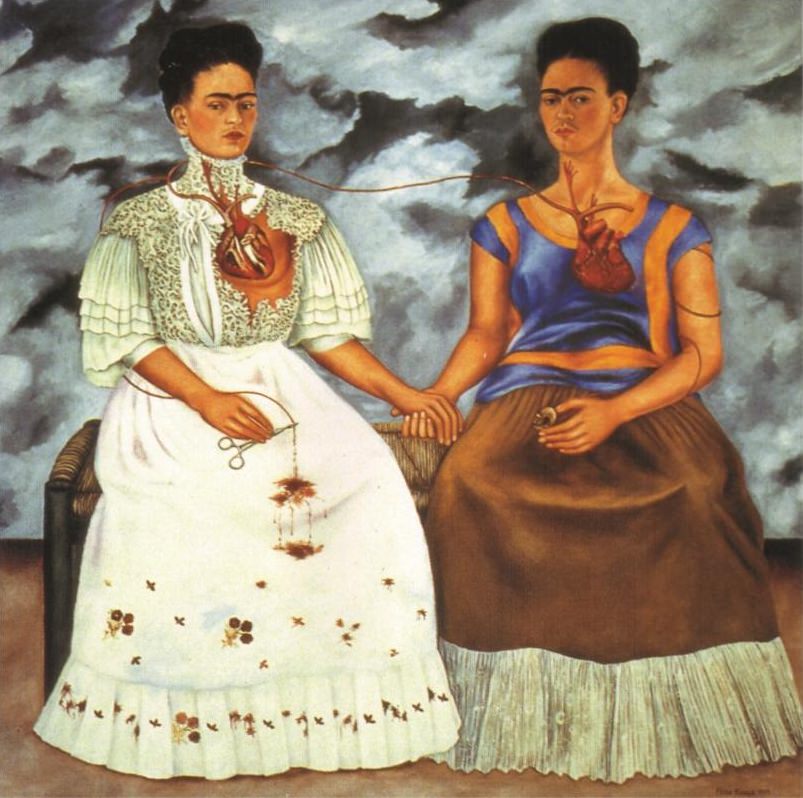
“Art is a creative response to primal pain,” my college professor used to say. I’d always agreed with her, though I disliked art that read as dissociation from pain. Now I wondered if my professor had not taken her assertion far enough. I wondered if art could actually be a solution.
————————————
In my work as an intuitive, my clients often ask if I see the dead. I do, but more often I see their younger selves, usually at an age when they’ve been traumatized in some way. Although people think they’re coming to me to learn about their future, what they really want are happier and fuller lives now. And what I’ve observed over the 15 years I’ve been conducting readings is that a better integration of our many selves–of our many Russian dolls–is the only way to do that.
The initial split between the waking self and the soul usually begins with the first trauma–when a person first realizes she is not safe emotionally, physically, and/or sexually. Then she begins to protect herself in a way that impedes the reception of missives from her highest self. That part of herself that belongs to the Flow.
Under the auspices of “metaphysician, heal thyself,” it took a long time to apply what I observed in my practice to my own fraught relationships.
———————
As a young girl, I trusted the universe but not people. So I prayed every day though I don’t remember why or how I started doing that. (My agnostic parents were perplexed.) I prayed for the protection of myself and the people I loved. I prayed for people who seemed to be in trouble. I prayed to be beautiful, for pretty shoes, to do well on tests. Sometimes–not often–I prayed to express gratitude for wishes already granted.
I never wondered who was receiving these prayers. I didn’t think it was a “who” at all. I just felt a warm, loving flow.
I had faith in the Flow.
But I never applied my big glorious faith to other people. Even when I loved them, other people were what you survived, not who you trusted. I learned that before I could talk.
Now, as I watched and rewatched Russian Doll, I thought about how that faith had saved me. That it had acted as an internalized good parent, even as it had deepened my fragmentation.
We’re all haunted by the parts of ourselves that have been stunted by trauma. The parts who have internalized the messages that we are unsafe and unlovable. Those parts are always hijacking our behavior unconsciously. Magnetizing us toward their pain.
Exerting a gravitational pull that yanks us out of the Flow.
For gravity isn’t just exerted by matter but by energy. And gravity doesn’t just move masses. It also moves time.
This accounts for all the “coincidences” between people with strong chemistry attracting them to each other. It also accounts for what I think of as spiritual GPS, in which we’re drawn again and again to replications of our most powerful traumas until we accept what and how we need to progress.
So what I am seeing in my most blocked clients are their younger selves as poltergeists, dragging them backward on the timeline. Only when we re-integrate ourselves through love and faith can we really leap forward. Otherwise, the scared, stunted selves we carry are too afraid to let us go.
We’re all time travelers in this way. Rarely do we occupy the present, let alone step into the unknown future. To the traumatized children we carry, the abyss and the future look exactly alike.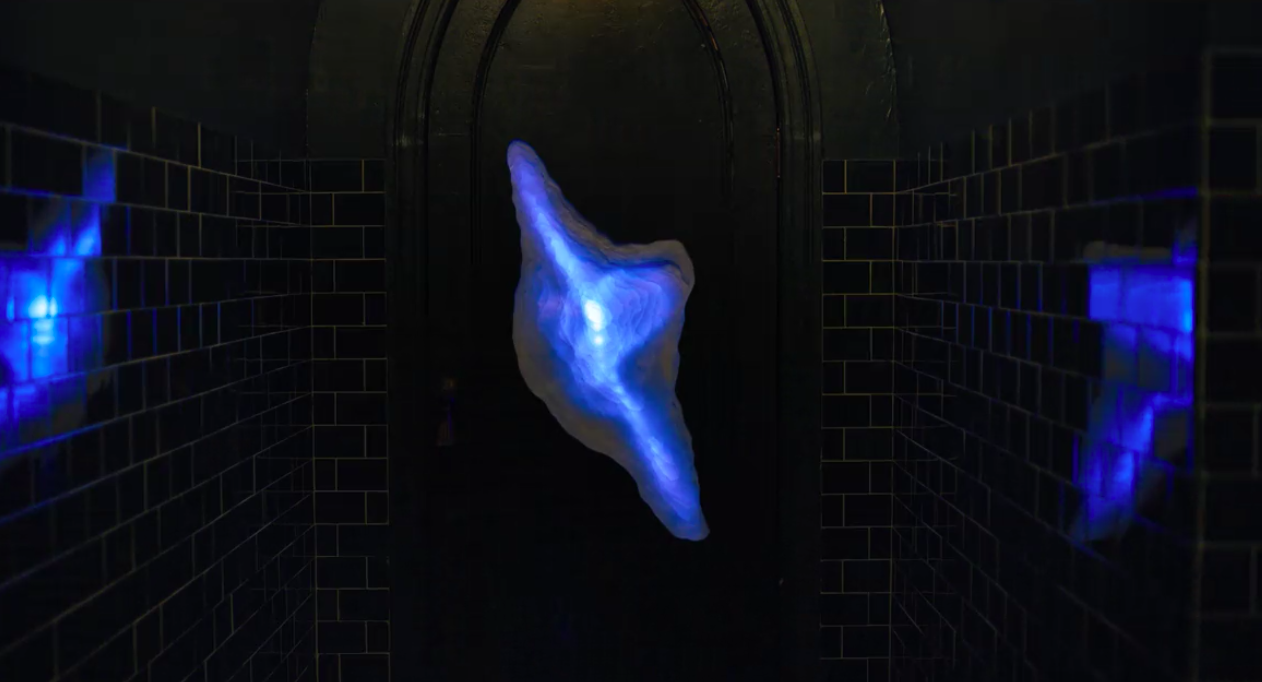
It all comes back to that speech that good-Jew Natasha gives to the Russian Doll rabbi.
Mysticism teaches us that there is wisdom unattainable by the intellect. You can only reach it through surrender. The nothing. Turn away from the physical world. Turn toward the spiritual one. Maybe Nadia is just a way to stay distracted. To avoid the abyss. When embracing it is the only way forward.
The twentieth time I watched that scene, I finally got it. What the rabbi really was describing wasn’t an abyss. It was a sacred unknown.
———
In the last real conversation that the Legend and I ever had, I told him I no longer wanted to be with anyone who wasn’t proud to have me in his life.
“I deserve better,” I said.
“Oh, you think so?” he said. He was blinking furiously.
We were walking to my house and when we arrived at my door, he said, “Go inside, baby.”
“What does this mean?” I said.
He said it again. “Go inside, baby.” Then he hurried down the street and I collapsed on my stoop, sobbing.
It was the first really cold afternoon of that autumn, but only after I was truly sure he wasn’t going to double back did I go inside my building.
The sky went dark before I climbed upstairs.
The girl waiting on that stoop was not an adult. She was little Lisa waiting after school, in countless stores’ customer service offices, in empty playgrounds and an empty kitchen, even sometimes on the other side of the highway where my childhood home was perched. Always waiting for my mother to pick me up, feed me, help me cross the road. Protect me from herself and the wolves around her. Remember she had a kid who needed her.
I stopped waiting for my mother when I was 7.
I never stopped waiting for my mother.
But eventually that night I stopped waiting for the Legend. Instead I curled into a fetal ball and cried myself to sleep.
Oh, I knew friends would congratulate me later for finally ending it. But I also knew as I wept in my cold, unlit apartment that none of them would hold me with the fierce intensity that he had. That the soft animals of their bodies would never love the soft animal of mine as his had. That none of them could rescue me from the loneliness from which I had thought the Legend and I could rescue each other.
I was 47.
But really I was 7.
I knew, too, that the Legend feared the abyss even worse than even I did. That both his parents had been too broken to love him; that, like me, he’d spent his childhood protecting himself from the very people who were supposed to protect him. He had been a roaring drunk for a long time because of it, and now was a dry drunk who carried a roaring emptiness masked with razzmatazz and quick quips. I knew that he craved fame rather than the achievements that might circuitously bring about fame because he craved affirmation and attention.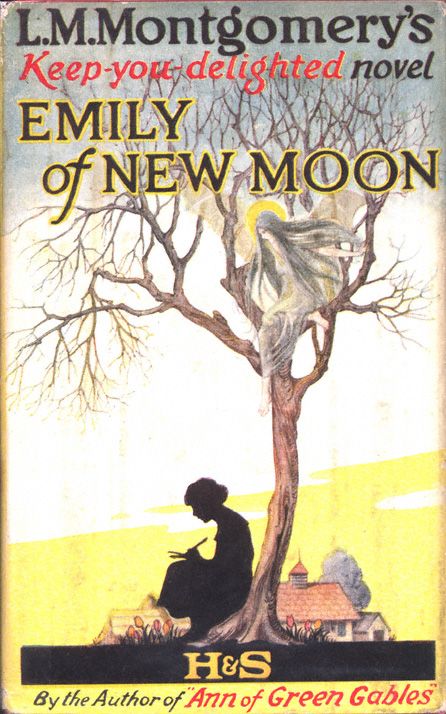
I thought of how he was like Nadia, jiving like a court jester because he couldn’t afford any strong feelings. Couldn’t afford to let anyone in.
I’ve long known that addiction and narcissism are two sides of the same coin. That both occur when nothing is real but your bottomless, futile—
—————-
While I’ve been writing this, I’ve been stopping now and then to do readings for clients. And just now one shared a dream that immediately summoned an Ellen Gilchrist passage that captures what I was about to describe here.
I cannot get you close enough, I said to him, pitiful as a child, and never can and never will. We cannot get from anyone else the things we need to fill the endless terrible need, not to be dissolved, not to sink back into sand, heat, broom, air, thinnest air. And so we revolve around each other and our dreams collide. It is embarrassing that it should be so hard. Look out the window in any weather. We are part of all that glamour, drama, change, and should not be ashamed.
That this passage arrived on behalf of a client while I’ve been writing this, just like that rabbi’s passage arrived in Russian Doll just when I needed an anchor for another client as well as for for my recovery from the Legend, well. It’s proof positive of the Flow through which we all are connected, and for which art–literature, film, music, you name it–often serves as portal.
And the abyss is the energy-sucking black hole we all become when we don’t recognize anything outside our pain. When we don’t let in the light connecting us all. This is why only AA really treats addiction. With its 12 steps of self-reckoning and accountability, it teaches us that we must treat ourselves and others lovingly because we are all part of the divine.
Because we are all beloved children of the Universe.
The real mystery is not the abyss, with which we are painfully familiar, but that Flow, a divine whole we only glimpse in snatches. It is a mystical question mark.
It is the sacred unknown.
So in crafting a story in which her self-destructive stand-in is doomed to live out the same story over and over with a raging entropy, Natasha Lyonne has crafted a nonlinear meta-model of recovery that is is the opposite of the de-rigueur ouroboros made popular by such filmmakers as Charlie Kaufman. Her wormholes are not just speculative. They are instructive. Because they acknowledge that we only can move forward when we acknowledge the humanity of each other and the love that connects us all.
I was in awe.
And then I ran into the Legend.
———————————
He and I had been avoiding each other since our November breakup. I had longed to see him and been terrified to see him, but only when I stopped worrying about it did the run-in happen. He was sitting at the coffee shop with his ex-wife’s current wife and her very young son. Exactly as I’d left him, so to speak.
Speaking of wormholes.
The Legend behaved just as I had most feared he would–with the same impersonal remove as last time. He heaved to his feet and made generic chit chat–Hey, how ya doin?–then quickly returned to his conversation. Motionless and unmoored, I loomed over the two of them, a lunatic in red lipstick.
When we had been together, he had often made us late by stopping to make extensive conversation with friends of friends whose names, he’d confess later, he didn’t know. Yet even after the many times he’d whispered my name as we’d made love in the middle of the night, he wouldn’t give me two seconds now.
I’d cried over this man, raged over him, masturbated over him so often that I could still feel his fingers inside me. Now I realized I had put off seeing him because I didn’t want to see what I was seeing now.
That my absence had not changed him. That nothing about me ever would.
I felt the quicksand rising again to swallow me into the abyss.
“Do you want a coffee?” said the barista, the same friendly pity in her eyes as last time. It was her look that pulled me out of my black hole. For I did want a coffee, and did not want to abandon the social contract just because I had been dismissed out of hand.
I ordered an Americano, paid and thanked her, and went back to the table where the Legend and his people were huddled. I complimented their child before slinging my bag over my shoulder and saying goodbye.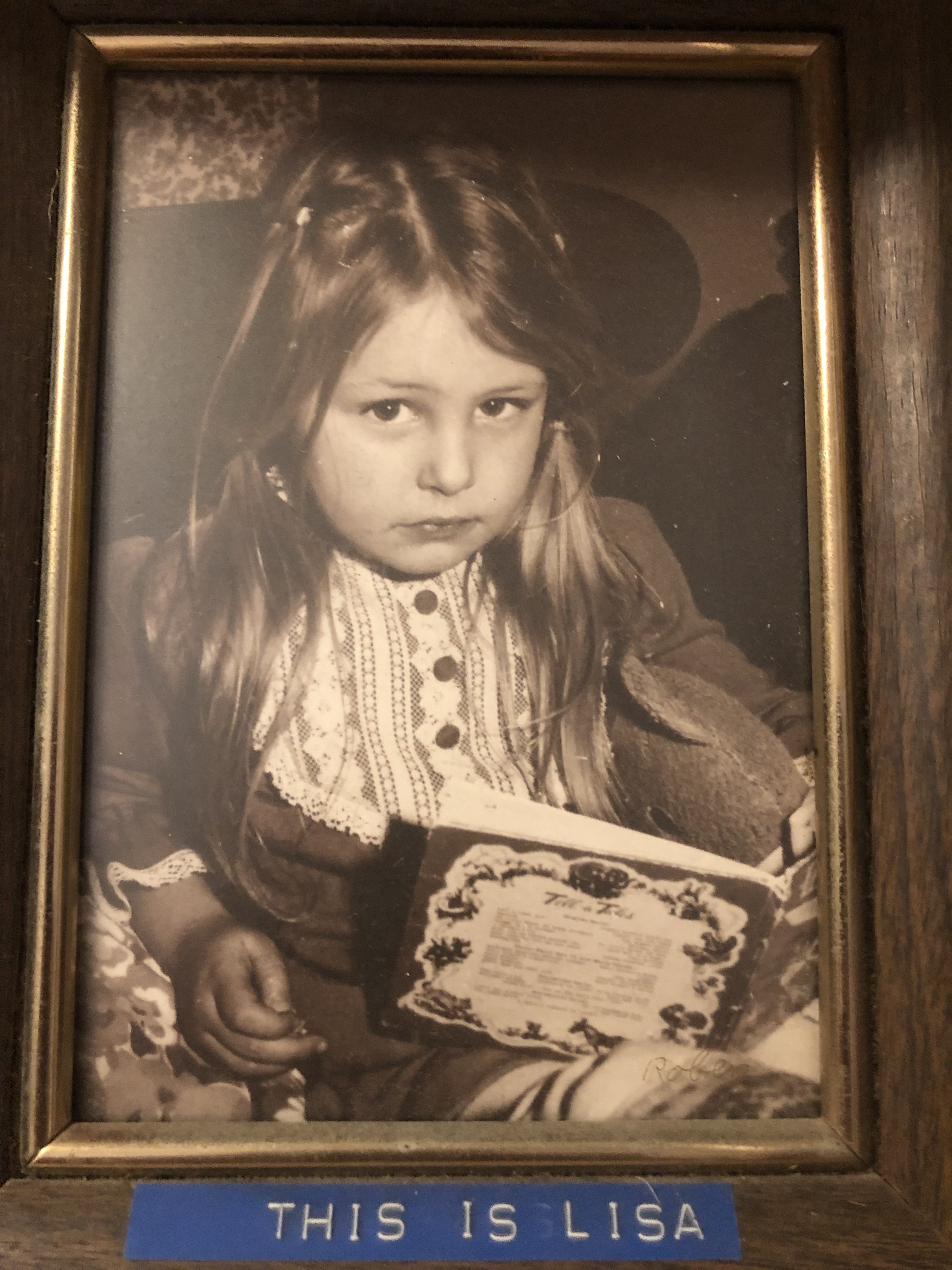
“It was nice to see you,” I said. “Take care.”
The Legend never looked me in the eyes.
I’d barely exited before tears began streaming, but my spine remained straight and my smile sincere. It was true that in the past my Child had hijacked our relationship almost as much as his had. But this time, I had not stamped my foot nor pulled any faces. I had behaved as my grownup self.
I loved this man and always would. But in this interaction–this iteration, really–I had not let either of our younger selves pull me out of the present.
For me at least, the time loop was now closed.
As I walked back to my house, I saw a child on the side of the road–chubby cheeks, hopeful smile, hurt eyes. Another child appeared–long hair and legs, jutting jaw, preternaturally fierce gaze. Holding the smaller child’s hand, she was staring at me. Then she tentatively smiled, and I smiled back.
And kept moving down the street.
